HOW CAN WE HELP YOU? Call 1-800-TRY-CHOP
In This Section
Cell and Gene Therapy Stories Lead Our Most Popular of 2023
Look no further for a reflection of what 2023 was like at Children's Hospital of Philadelphia Research Institute: Our annual wrap-up of the top six stories is here. We tallied up our most popular blog stories of 2023 based on engagement data across our CHOP Research social media platforms, as in previous years.
Not surprisingly, our community of Facebook, LinkedIn, and Twitter/X followers enthusiastically liked, commented, and shared stories about CHOP's involvement in the Bespoke Gene Therapy Consortium, the launch of the Novel Therapeutics for Bleeding Disorders (NoT Bleeding) Frontier Program, and other stories centered on innovation, thought leadership, and advanced technology.
Making Way for Gene Therapy in Rare Disease
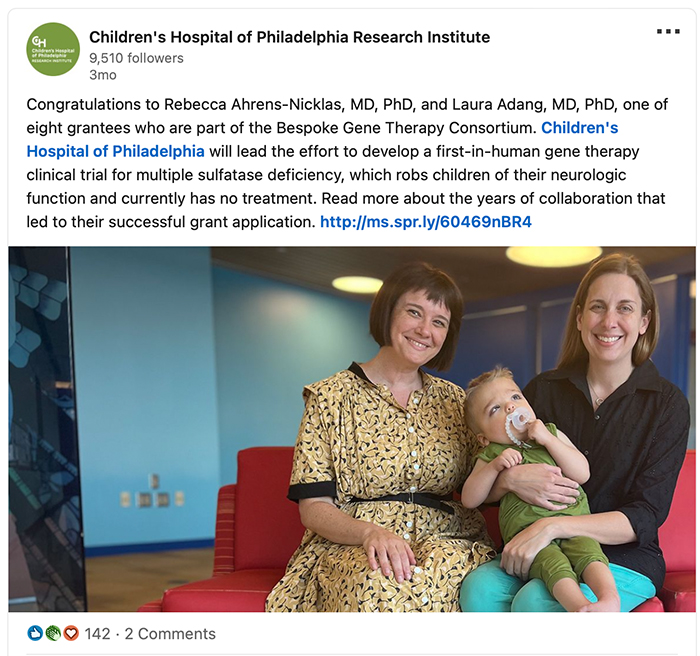
Our LinkedIn post about CHOP's involvement in the Bespoke Gene Therapy Consortium garnered many engagements from followers.
In August, two CHOP researchers received grant support from the Foundation for the National Institutes of Health (FNIH) to develop the first-in-human gene therapy trials for eight rare conditions through the Accelerating Medicines Partnership Bespoke Gene Therapy Consortium (AMP BGTC).
Rebecca Ahrens-Nicklas, MD, PhD, physician scientist in the Division of Genetics, and Laura Adang, MD, PhD, attending physician in the Division of Neurology, announced they would lead the AMP BGTC study site for multiple sulfatase deficiency (MSD), an ultra-rare genetic disorder.
The grant came on the heels of years of friendship and scientific collaboration between Drs. Ahrens-Nicklas and Adang. The duo also spent years building relationships with the families of rare disease patients for whom such a gene therapy would help.
Our Cornerstone story about this exciting effort received hundreds of engagements on social media, including congratulatory comments, 'likes' from patient families, and re-posts across our community. Read the full story on Cornerstone.
CIGT Advances CHOP's In Vivo Gene Therapy Leadership
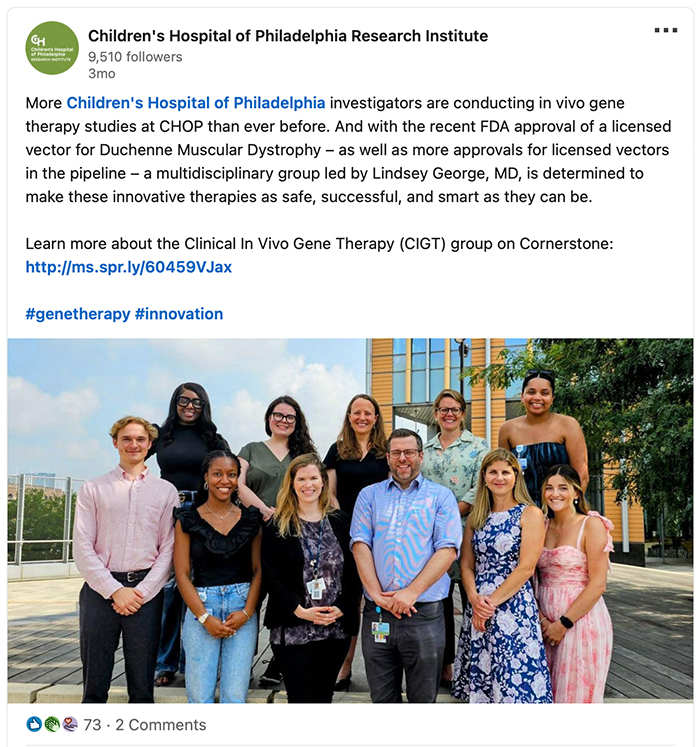
CHOP Research LinkedIn followers loved our post about the Clinical In Vivo Gene Therapy Group (CIGT).
The year 2023 marked a peak in the number of in vivo gene therapy clinical studies underway at CHOP, with more than 20 clinical trials spanning seven clinical divisions as of August. On Cornerstone, we published a story about the multidisciplinary group seeking to unite them all: the Clinical In Vivo Gene Therapy group (CIGT).
Led by CIGT director and hematologist Lindsey George, MD, the group brings together physician investigators, clinical research coordinators, regulatory specialists, and operation specialists in a streamlined effort to ensure all in vivo gene therapy research groups have the support to advance safe, smart, and successful clinical trials.
“We've been developing in vivo gene therapy for approaching three decades," Dr. George said in the story. “The breadth and depth of work and the longevity in this space is unparalleled. The volume of clinical trials is completely unique to CHOP. Other institutions have conducted a depth of work in X space. We're doing a lot of work in A, B, C, through Z space. Our hospital and Research Institute have truly been seminal players in this space for decades."
Reflective of its reach across many different groups in our community, our social media posts about the CIGT received some of the highest number of engagements of the year. Read more about the CIGT on Cornerstone.
Medicine of the Future: Delivering mRNA Gene Editing Tools In Vivo
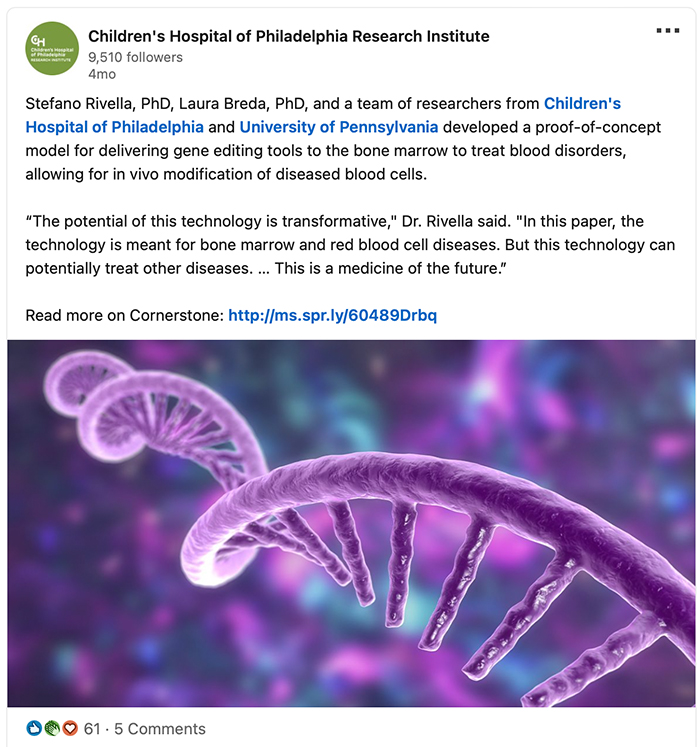
On social media, posts about Dr. Rivella's Science study were met with many comments, likes, and shares.
As in vivo gene therapies break ground, how are scientists harnessing its mechanisms for conditions currently administered via ex vivo gene treatments? In 2023, scientists at CHOP covered that, too.
Currently, to treat blood disorders like sickle cell disease and beta thalassemia with gene therapy, patients undergo a complex treatment that involves myeloablation (doses of chemotherapy to eliminate mutated hematopoietic stem cells (HSC) in the bone marrow), followed by the harvest and modification of HSC, then transplantation of HSC back into the body.
In July, however, a breakthrough study published in Science introduced a proof-of-concept model for delivering gene editing tools to the bone marrow via liquid nanoparticles. This new method allows for the modification of diseased blood cells directly within the body through in vivo cellular reprogramming and eliminates the need for myeloablation.
"The potential of this technology is transformative," Stefano Rivella, PhD, said in our Cornerstone story. "In this paper, the technology is meant for bone marrow and red blood cell diseases. But this technology can potentially treat other diseases. If we could deliver a cargo that corrects a mutation in the bone marrow, we can conceive alternative formulations to correct mutation in the brain, lung, or liver — this is the technology that will allow us to do that. This is a medicine of the future."
On LinkedIn, Facebook, and Twitter/X, posts about the study received many comments, likes, and shares. Read the full story on Cornerstone.
First Arcus Omics Data Launch: Q&A With Ingo Helbig, MD
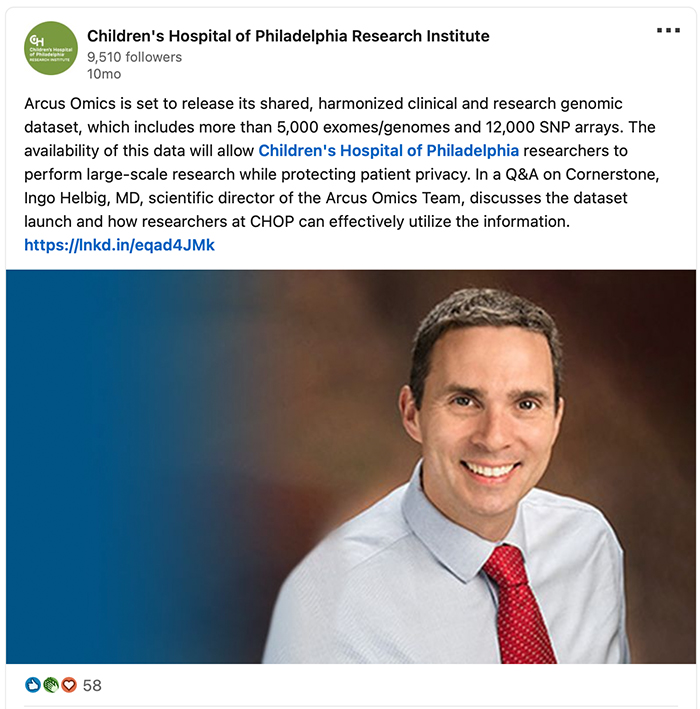
A Cornerstone Q&A with Dr. Helbig, scientific director of Arcus Omics, ranked high in our most engaging stories of 2023.
Gene therapies aren't the only innovation to make our top six stories on social media. A Cornerstone Q&A with Ingo Helbig, MD, attending physician and scientific director of Arcus Omics, ranked high in our most engaged stories of 2023.
In the Q&A, Dr. Helbig describes the impact that a new platform called Arcus Omics will have for CHOP researchers. Arcus, CHOP's centralized research data repository, launched Arcus Omics, it's first genomic dataset that includes more than 5,000 exomes/genomes and 12,000 chromosomal SNP arrays.
The availability of this data allows CHOP investigators to perform large-scale research while protecting patients' privacy.
“Combining data from across the enterprise sounds simple in theory, but it is a herculean task," Dr. Helbig said. “Having an easily accessible, institutional omics dataset is new for CHOP, and we are extremely excited to have laid the foundation for this resource. This dataset will expand rapidly, and we expect that it will enrich CHOP's omics landscape in a broad fashion. This is omics data that every clinician and researcher at CHOP can access."
Read the full Q&A on Cornerstone.
NoT Bleeding Program Advances Therapies for Hemophilia A and B
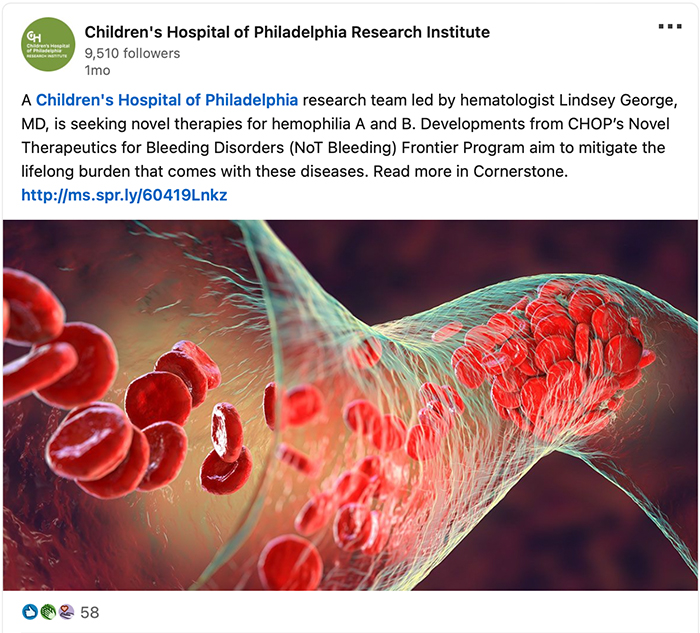
One of 2023's top stories celebrates years of dedication our researchers have contributed to developing gene therapies for bleeding disorders.
CHOP has been at the forefront of developing in vivo gene therapies to treat hemophilia for over two decades. It comes as no surprise, then, that among the top stories of the year is one that acknowledges the years of dedication our researchers have contributed to treating bleeding disorders.
In 2023, CHOP designated Frontier funding and support for the Novel Therapeutics for Bleeding Disorders (NoT Bleeding) Program, led by Dr. George; Rodney Camire, PhD; Ben Samelson-Jones, MD, PhD; Leslie Raffini, MD; and Bhavya Doshi, MD. Frontier Programs put cutting-edge research on the fast-track, and in this case, CHOP researchers aim to accelerate their development of next generation therapeutics for hemophilia A, B, and other bleeding disorders.
Dr. George led the first gene therapy clinical trial to successfully achieve normal or near-normal factor IX activity for adult patients with hemophilia B. In 2017, Dr. George and colleagues were the first to report in the New England Journal of Medicine, that the treatment "nearly universally eliminated" the need for infusions of clotting factor.
Researchers in the NoT Bleeding Program seek to advance these discoveries and mitigate the lifelong burden patients with hemophilia carry.
Read the full story on Cornerstone.
'New Technologies Lead to New Discoveries:' Q&A With Mustafa Mir
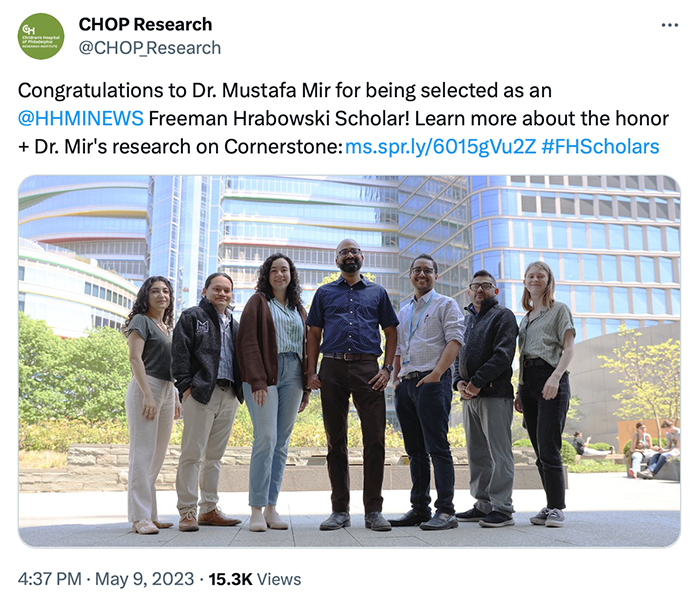
Posts about Dr. Mir's designation as a Howard Hughes Medical Institute (HHMI) Freeman Hrabowski Scholar ranked high in engagements from our followers.
The subject of our last, but certainly not the least, top story is no stranger to ranking high on our most engaging social media posts. Last year, Mustafa Mir, PhD, assistant professor in the Center for Computational and Genomic Medicine, and his lab made our top six list for their award from the NIH Common Fund's High Risk, High Reward Program. This year, Dr. Mir made the list for yet another accolade – his designation as a Howard Hughes Medical Institute (HHMI) Freeman Hrabowski Scholar. Our Tweet about Dr. Mir's award garnered more than 15K views and more than 75 likes!
The new HHMI scholar program supports early career basic science faculty or physician-scientists who demonstrate a commitment to mentorship and advancing diversity, equity, and inclusion in science. In the Q&A, Dr. Mir discusses how the scholarship is important to his mission and how he harnessed his engineering background to forge a path to understanding how gene expression is regulated.
(A bonus: Watch Dr. Mir's lab evolve in his Lab Life video, also published in 2023 on Instagram.)
